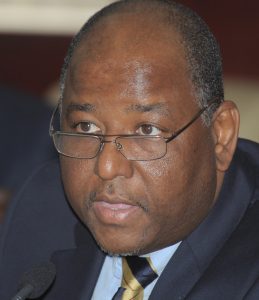Opposition prevents substitute James from entering parliament
 PHILIPSBURG — The opposition benches remained empty on Monday morning when parliament was supposed to examine the credentials of substitute MP Jules James. Due to a lack of quorum, the meeting could not take place. It seems that a new political storm is brewing, just when suspended MP Theo Heyliger announced in a rather cryptic message that he steps down as leader of the United Democrats.
PHILIPSBURG — The opposition benches remained empty on Monday morning when parliament was supposed to examine the credentials of substitute MP Jules James. Due to a lack of quorum, the meeting could not take place. It seems that a new political storm is brewing, just when suspended MP Theo Heyliger announced in a rather cryptic message that he steps down as leader of the United Democrats.
Heyliger remains in pretrial detention in Bonaire. In a letter to UD board member Marinka Gumbs, dated March 21, Heyliger stated that he resigns immediately as leader of the party.
The letter was signed on behalf of Heyliger by his attorney Eldon Sulvaran, who confirmed that the letter is authentic, taking away doubts that arose from the fact that the letter was not written on correspondence paper from his law office. Instead, the signature was accompanied by a stamp of Sulvaran & Peterson.
It remains unclear whether Heyliger’s resignation as party leader amounts to his departure from politics. Earlier last year he announced that the 2018 parliamentary elections had been his last elections. Currently Heyliger’s membership of Parliament is suspended because he is in pretrial detention as a suspect in the Larimar-investigation into bribery and money laundering.
United Democrats candidate number 8, Jules James was supposed to be sworn in on Monday as Heyliger’s substitute, but according to constitutional law professor Arjen van Rijn his tenure would end the moment Heyliger is released from pretrial detention.
Asked by stmaartennews.com about the situation that will arise the moment Heyliger’s pretrial detention ends, Van Rijn referred to the regulation laid down in St. Maarten’s Constitution.
“Based on article 50, paragraph 2 (sub a.) Mr. Heyliger has only been suspended. during his suspension he is replaced by a substitute (see article 50, paragraph 3). The suspension ends the moment the pretrial detention ends, assuming that there is not a prison sentence as described in article 50, paragraph 2, sub b. In the latter case the suspension continues.”
What happens when the suspension ends, as described above, is not directly regulated in the Constitution. But Professor Van Rijn is clear about it: “As soon as the suspension ends without a prison sentence – also when somebody is released pending trial – the substitution ends in my opinion by law and Mr. Heyliger will automatically take his seat again.”
###
Related articles:
Opinion piece: “Hostage”


























